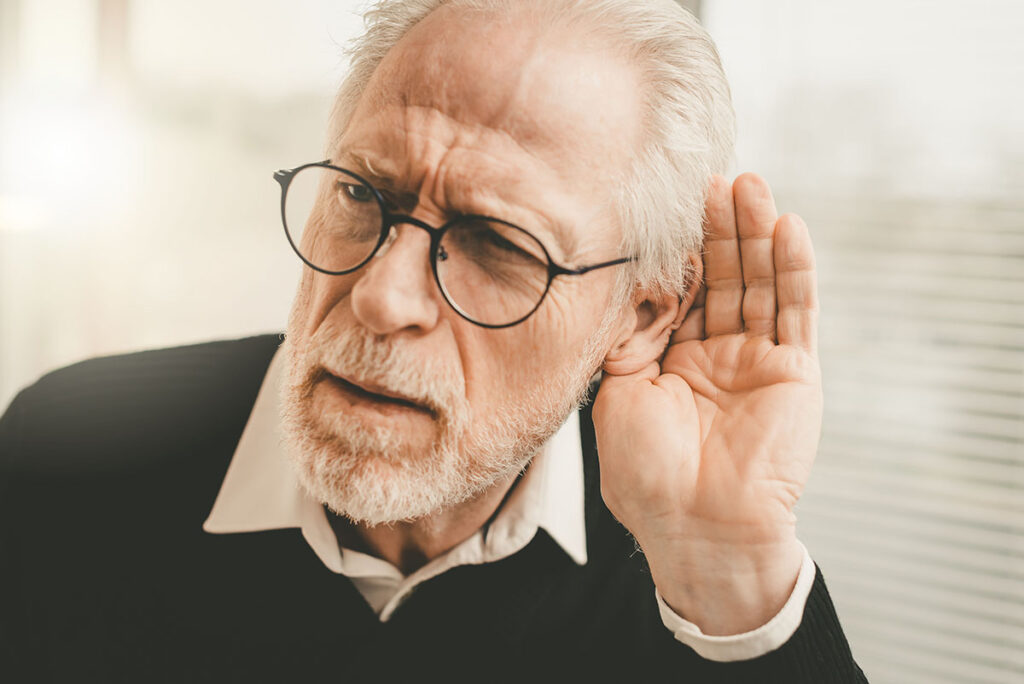
If you have hearing loss, does it mean that you also have a higher risk of dementia? The latest research in aging shows a connection between hearing loss and cognitive decline. While additional research is needed, some researchers are starting to suggest that hearing loss might be a cause of dementia.
It’s easy to see how hearing loss is both frustrating and inconvenient. Not only is the patient affected, but loved ones also experience the awkwardness of communication issues and more.
In addition to the way that hearing loss affects everyday life, there are also indications of more serious consequences – such as dementia and cognitive loss. Additionally, patients with hearing loss often have a higher risk of falls and walking problems. So, treating hearing loss can help with communication and might also reduce the risk of related issues.
Johns Hopkins started this conversation with a research study that lasted nearly 12 years. During the course of this research, they tracked 639 adults to see how their hearing impacted dementia risk.
There is a lot of evidence showing that hearing is a very important part of brain health. The results showed that if someone has mild hearing loss, then their risk of dementia doubled. Patients with moderate hearing loss had a triple risk of dementia. Patients with severe hearing loss were 5x more likely to develop dementia.
While hearing loss is not the only cause of cognitive decline, the research is showing that it could play a significant role. A study published in 2020 lists 12 key factors in the development of dementia that could be modified, and hearing loss is one of these risk factors. The good news is that all of these factors can be treated to hopefully reduce the risk of dementia for patients. One of the highest modifiable risk factors for dementia is addressing hearing loss in middle age.
It’s estimated that hearing loss is the cause of at least 8% of dementia cases. Since 10 million new dementia cases are diagnosed annually, this means that hearing loss could be contributing to 800,000 patients who are diagnosed with dementia!
Why does hearing loss increase the risk of dementia and cognitive decline? The theory is that hearing loss causes a faster atrophy rate in the brain. Brain scans have been done to measure how the brain is being affected over time, and there are concerns about the findings.
Additionally, patients with hearing loss tend to feel more isolated from a social perspective. They have a harder time following conversations, which means they often spend less time with people. If someone isn’t as engaged in the communication or is spending more and more time by themselves, then it could be a factor that impacts the development of dementia.
It’s also clear that hearing loss can increase the risk of walking problems and falling. Even though you aren’t aware of it, when you are walking, your ears are always dialing in to seemingly small cues, which affect balance and movement. Patients with hearing loss are missing these small but important signals. As a result, the brain has to work harder. When the mental effort is constantly multitasking, it could have an impact on the way the brain is functioning while the person is walking – and increase the risk of walking safety.
Another interesting connection between hearing loss and cognitive decline is that there are times when hearing loss is misdiagnosed as dementia. Some of the signs of dementia include difficulty with communication – not only challenges with speaking, but also having a hard time understanding what other people are saying. Patients with dementia have difficulty processing what they are hearing, especially if there are other distractions during the conversation.
The difficulty with information processing is one of the first signs of dementia. But it is also a sign of hearing loss. If a patient has hearing loss and they are having difficulty with conversation, then it could make it seem like they have dementia. Doctors who fail to complete a hearing test might mistakenly determine an inaccurate diagnosis of dementia.
So, if you or a loved one is starting to display symptoms of dementia, then make sure to get a hearing test as you are navigating the diagnostic process. It’s possible that hearing issues can be addressed with hearing aids or other treatments, which might help to improve communication and information processing.
A diagnosis of hearing loss can be a good sign because hearing loss can be treated using hearing aids. There is much more hope of improvement for hearing loss than there is for cognitive decline. Additionally, if a patient is at a high risk of dementia, then hearing aids might be an effective solution to slow this cognitive decline.
If you have hearing loss and have been avoiding hearing aids because they seem inconvenient, then it might be time to talk to an audiologist about your treatment options. While there haven’t been any research studies about how hearing aids might slow the development of dementia, there are many benefits that come from the use of hearing aids. It’s possible that improving your hearing now could slow brain atrophy, which might decrease or delay the risk of cognitive decline.
Most people who wear hearing aids find numerous benefits in their daily lives. Yes, it takes a bit of time to get used to wearing hearing aids. But once you have adjusted, there are many aspects of life that improve – including social connections, conversations, and being more involved in your community again.
When you suspect that you or a loved one might have hearing loss, then the best thing you can do is visit an audiologist for a comprehensive hearing test. We offer full-service solutions to ensure an accurate diagnosis, as well as effective treatment options. We invite you to contact our team when you are ready for more information. Reach out to us at Fairfax Hearing Center to schedule a consultation.